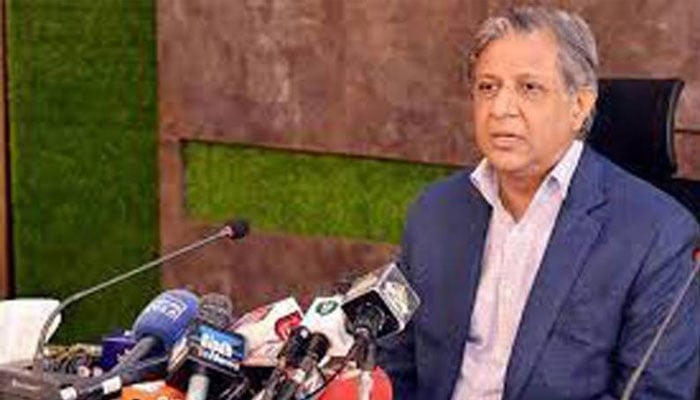Asma Jahangir Conference: Law minister faces tough questions on missing persons
LAHORE: Family members of the missing persons narrated their ordeal during a session on at the Asma Jahangir Conference in Lahore.
During the session — Reluctance to Criminalise Enforced Disappearance and Arbitrary Detentions —Balochistan National Party-Mengal (BNPM) chief Sardar AKhtar Mengal said, “Our governments change, but our situation does not because the ones in control of our situation are unable to change their mindset.
Mengal narrated the story of a woman whose son has been missing for the eight years. She traveled on donations collected from outside a mosque to attend a rally for the recovery of missing persons.
Referring to the bodies found on Nishtar Hospital rooftop, Mengal said, “These bodies were not found in the mountains. This was on the rooftop of a hospital in the City of Saints.” Federal Law Minister Azam Nazeer Tarar said that after four and a half years of being buried in files, the current government has finally recovered the Missing Persons bill, thanking Mengal for demanding removal of unfair provisions in the draft.
Tarar, also head of committee on enforced disappearances, faced criticism by all speakers as he opened the session to take credit for the recently passage of a bill by the National Assembly, which criminilises forced disappearance.
Sammi Deen Baloch, human rights activist and daughter of a missing person, said, “We have seen such bills and commissions since 2011, but their implementations remain a distant dream. What will you say of the recently legislation against torture, and for free and fair trial? Has any culprit been punished?”
She said that in 2010, rights activists demanded a report on missing person, adding that in 2012, the then top judge ordered trial of 34 security personnel in the case of missing persons and ordered the immediate release of missing people. In one such ruling, the court also ordered the government to assume the missing persons, who are government officials, alive and resume paying their salaries. She added that, as per court order, no unclaimed body could be buried without a DNA test.
Manzoor Pashteen lamented that former FATA areas are facing a “state of exceptions”. He said that since 2001, normal rules were changed and a new narrative about national security was built. That regime targeted every journalist, individual, or group which was thinking independently. He said media, courts, parliaments and civil society were powerless to tackle those targeting free thinking.
He added, “Rao Anwar, who is accused of killing 404 persons extrajudicially, is roaming free, while Ali Wazir, whose 18 family members were killed was jailed. This is the state of justice.” Sher Mohammad, president of the High Court Bar Association, Mingawara Bench, shared his struggle for the release of missing persons of Pata and Fata areas with the late Asma Jahangir. He said nothing worked out as if he got a favourable verdict, it was suspended.
Shabbir Hussain Gigyani, senior lawyer of the Peshawar High Court, said the previous government had moved the recently passed bill. The National Assembly passed it, but it went missing in the Senate. He feared the same fate for the recent bill in the Senate too.
Angkhana Neelapaijit, member of the United Nations working group on enforced or involuntary disappearances, cited different international laws which criminilsed enforced disappearances. She said the working group demanded that Pakistan stop enforced disappearance, and uphold the right to personal freedom.
-
 Pentagon Threatens To Cut Ties With Anthropic Over AI Safeguards Dispute
Pentagon Threatens To Cut Ties With Anthropic Over AI Safeguards Dispute -
 Meghan Markle's Father Shares Fresh Health Update
Meghan Markle's Father Shares Fresh Health Update -
 Travis Kelce Takes Hilarious Jab At Taylor Swift In Valentine’s Day Post
Travis Kelce Takes Hilarious Jab At Taylor Swift In Valentine’s Day Post -
 NASA Confirms Arrival Of SpaceX Crew-12 Astronauts At The International Space Station
NASA Confirms Arrival Of SpaceX Crew-12 Astronauts At The International Space Station -
 Can AI Bully Humans? Bot Publicly Criticises Engineer After Code Rejection
Can AI Bully Humans? Bot Publicly Criticises Engineer After Code Rejection -
 Search For Savannah Guthrie’s Abducted Mom Enters Unthinkable Phase
Search For Savannah Guthrie’s Abducted Mom Enters Unthinkable Phase -
 Imagine Dragons Star, Dan Reynolds Recalls 'frustrating' Diagnosis
Imagine Dragons Star, Dan Reynolds Recalls 'frustrating' Diagnosis -
 Steve Jobs Once Called Google Over Single Shade Of Yellow: Here’s Why
Steve Jobs Once Called Google Over Single Shade Of Yellow: Here’s Why -
 Barack Obama Addresses UFO Mystery: Aliens Are ‘real’ But Debunks Area 51 Conspiracy Theories
Barack Obama Addresses UFO Mystery: Aliens Are ‘real’ But Debunks Area 51 Conspiracy Theories -
 Selma Blair Explains Why Multiple Sclerosis 'isn't So Scary'
Selma Blair Explains Why Multiple Sclerosis 'isn't So Scary' -
 Will Smith Surprises Wife Jada Pinkett With Unusual Gift On Valentine's Day
Will Smith Surprises Wife Jada Pinkett With Unusual Gift On Valentine's Day -
 Shamed Andrew Has Paid Royal Favours With ‘national Scandal’
Shamed Andrew Has Paid Royal Favours With ‘national Scandal’ -
 Prince William Ticked Off By How Andrew ‘behaved With Staff’
Prince William Ticked Off By How Andrew ‘behaved With Staff’ -
 Prince William Questions Himself ‘what’s The Point’ After Saudi Trip
Prince William Questions Himself ‘what’s The Point’ After Saudi Trip -
 James Van Der Beek's Friends Helped Fund Ranch Purchase Before His Death At 48
James Van Der Beek's Friends Helped Fund Ranch Purchase Before His Death At 48 -
 King Charles ‘very Much’ Wants Andrew To Testify At US Congress
King Charles ‘very Much’ Wants Andrew To Testify At US Congress




